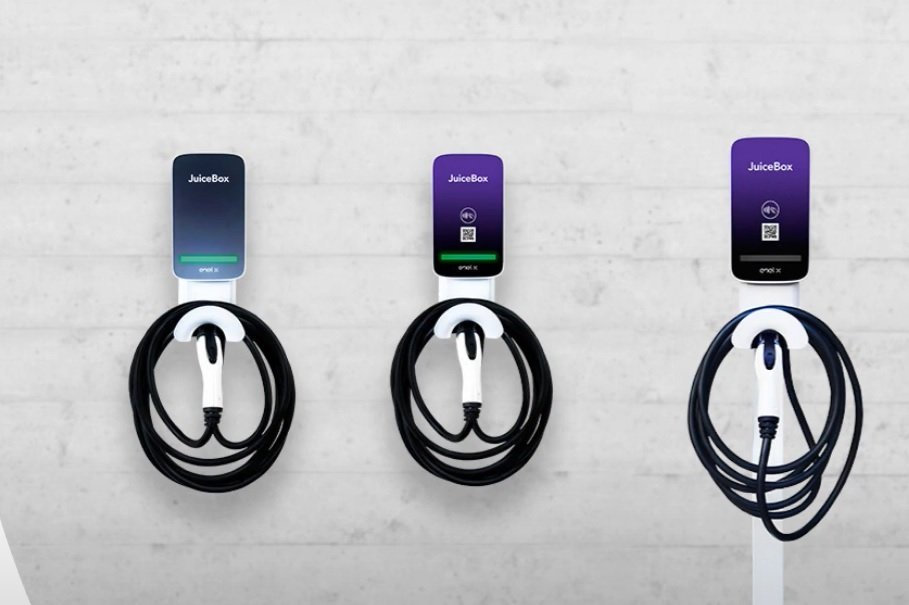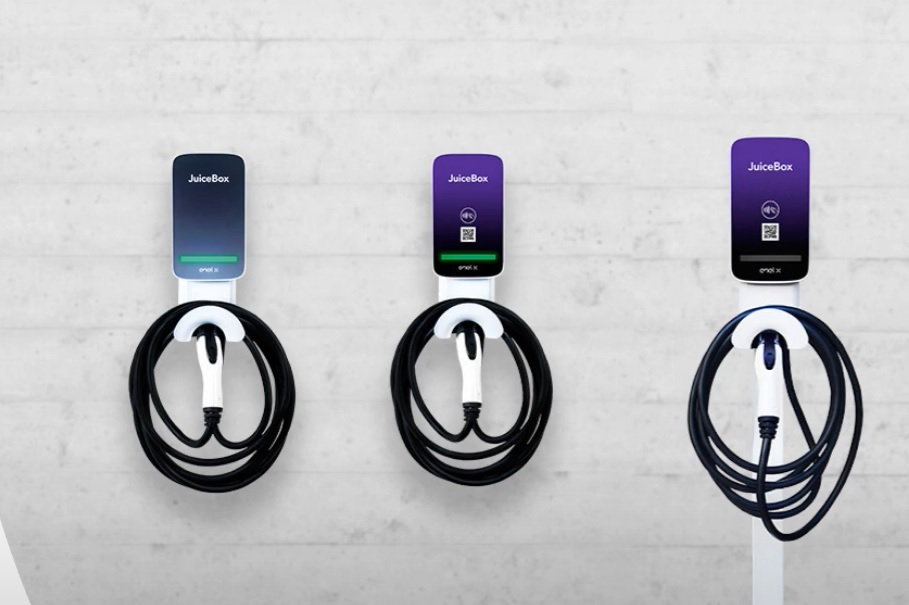Electric vehicles (EVs) are becoming more common on the road every year, and with that rise comes the need for easy, convenient ways to charge them. The JuiceBox EV Charger stands out as a popular choice among EV owners for its smart technology, user-friendly features, and reliable charging speeds. Let’s dive into what makes this charger so popular, how it works, and why it might be a great option for you.
What is the JuiceBox EV Charger?
The JuiceBox EV Charger is a smart home charging solution designed for electric vehicles (EVs). Developed by Enel X, this charger offers a convenient way to charge your EV at home with fast charging times, smart technology, and easy control from a mobile app. It’s known for its durability, safety, and user-friendly features that make charging easy, efficient, and even customizable to suit individual needs.
Why Choose the JuiceBox EV Charger?
If you’re an EV owner, charging speed and convenience are likely top priorities. The JuiceBox EV Charger offers:
- Fast charging capabilities, with options for both Level 1 and Level 2 charging.
- Smart features like Wi-Fi connectivity, energy usage tracking, and charging schedules, all controlled through the JuiceNet app.
- Compatibility with solar power, allowing eco-conscious users to charge using renewable energy sources.
- Durability for indoor or outdoor installation, built to withstand various weather conditions.
With these features, the JuiceBox is considered one of the best home chargers available.
Key Features of the JuiceBox EV Charger
Here’s a closer look at some of the standout features:
| Feature | Description |
| Smart Charging | Connects to Wi-Fi for scheduling, energy monitoring, and remote access via the app. |
| Fast Charging | Provides high-speed charging, especially with Level 2 (240V) for faster energy delivery. |
| Universal Plug | Equipped with the J1772 plug that fits nearly all EVs in North America. |
| Weather-Resistant | Designed to work safely indoors or outdoors in rain, snow, or heat. |
| Voice Control | Compatible with Amazon Alexa and Google Assistant for hands-free operation. |
| Smart Alerts | Sends real-time alerts to your phone for power interruptions or completion notifications. |
Benefits of the JuiceBox EV Charger
Using the JuiceBox at home comes with a range of benefits:
- Convenience: Skip the public chargers and charge at home.
- Cost Savings: Charging at home is often cheaper, especially if scheduled during off-peak hours.
- Eco-Friendly: Option to use solar power or charge during times when the grid is powered by renewable energy.
How Fast Can the JuiceBox EV Charger Charge?
Charging speed is an important factor for EV owners, especially if you drive daily. JuiceBox chargers provide a high charging rate compared to standard Level 1 chargers (which plug into a typical wall outlet and deliver around 3-5 miles per hour). Here’s a quick comparison:
- JuiceBox 32: Up to 25 miles of range per hour
- JuiceBox 40: Up to 30 miles of range per hour
- JuiceBox 48: Up to 37 miles of range per hour
These faster speeds mean you’ll have a full charge overnight, even if your battery is low.
Installation and Setup
Setting up a JuiceBox EV Charger is simple. Here’s a quick guide:
- Choose the Right Model: JuiceBox offers models with various power levels. The JuiceBox 40 (40-amp, 9.6 kW) is the most popular for home use.
- Install a 240V Outlet: For the fastest charging, you’ll need a 240V outlet installed by a licensed electrician.
- Connect to Wi-Fi: Use the JuiceNet app to connect to your Wi-Fi, and you’re ready to schedule charging, track energy usage, and receive alerts.
Cost and Savings of the JuiceBox EV Charger
Let’s look at an example of a user who drives around 40 miles daily. With a JuiceBox charger, the cost per charge is approximately $1.50-$2.50, depending on local electricity rates. Over the year, this would save about 30-40% compared to gas costs for a similar-sized car, potentially amounting to $500-$1,000 saved annually.
The JuiceBox EV Charger typically costs between $500 and $700, depending on the model and whether you choose hardwired or plug-in options. With Level 2 charging, the JuiceBox can help EV owners save on public charging fees over time, as well as reduce costs by charging during off-peak hours.
- Estimated Cost: $500–$700 (excluding installation)
- Installation Cost: ~$200–$500 for a 240V outlet if not already available
Is the JuiceBox EV Charger Compatible with Solar Panels?
Yes! The JuiceBox EV Charger is compatible with solar energy. This means you can connect it to a solar-powered home, allowing for eco-friendly, low-cost charging.
Comparing JuiceBox to Other EV Chargers
To see how the JuiceBox charger stands against other popular EV chargers, here’s a quick comparison:
| Feature | JuiceBox | ChargePoint Home Flex | Tesla Wall Connector |
| Charging Speed | Up to 9.6 kW | Up to 12 kW | Up to 11.5 kW |
| App Control | Yes | Yes | Yes |
| Universal Connector | Yes | Yes | No (Tesla only) |
| Voice Integration | Yes | Yes | No |
| Price Range | $600-$900 | $700-$900 | $500-$600 |
JuiceBox chargers stand out for their universal connector, app control, and compatibility with both Alexa and Google Assistant.
JuiceNet App: Control at Your Fingertips
One of the highlights of the JuiceBox EV Charger is the JuiceNet app. This app connects your charger to your Wi-Fi network, giving you full control over when and how your car charges. Some of the best features include:
- Scheduling: Set charging times to align with off-peak electricity rates.
- Energy Monitoring: Track how much electricity you’re using for EV charging.
- Remote Access: Start or stop charging from anywhere, even if you’re not home.
- Eco-Friendly Charging: Monitor if the grid is using renewable energy and schedule accordingly.
JuiceBox EV Charger Models
JuiceBox offers different models to meet diverse charging needs:
| Model | Power Output | Ideal For | Price Range |
| JuiceBox 32 | 32-amp, 7.7 kW | Small EV batteries, daily commutes | $500–$600 |
| JuiceBox 40 | 40-amp, 9.6 kW | Faster home charging, larger batteries | $600–$700 |
| JuiceBox 48 | 48-amp, 11.5 kW | Rapid charging for large batteries, fleet use | $700+ |
These models cater to different EVs, whether you need a more affordable option like the JuiceBox 32 or a faster charger with the JuiceBox 48.
Who is Enel X? The Company Behind the JuiceBox EV Charger
Enel X is a global leader in sustainable energy solutions, part of the Enel Group based in Rome, Italy. Founded in 2000, Enel X focuses on energy efficiency and renewable energy technology, with a mission to make smart, clean energy accessible to all. Their JuiceBox EV Charger is one of the most popular products in their e-mobility line.
How Enel X Entered the EV Charging Market
In 2017, Enel X acquired eMotorWerks, a U.S.-based EV charging company, allowing them to introduce the JuiceBox EV Charger with advanced smart charging technology. Since then, JuiceBox has grown to be a preferred home EV charger due to its easy installation, powerful charging, and integration with smart home systems.
Is Enel X Popular? Consumer Reception and Market Presence
Enel X has rapidly gained a reputation for innovative and eco-friendly energy solutions. The JuiceBox EV Charger is especially popular in North America due to the growing EV market. Some highlights:
- Customer Ratings: JuiceBox consistently ranks high among EV chargers, praised for ease of use, charging speed, and reliability.
- Market Growth: Enel X has installed over 100,000 EV chargers in the U.S., and JuiceBox is a top choice for homeowners.
Enel X’s Global Reach and Sales Progress
Enel X has a strong global presence:
- U.S. and Canada: Enel X is a leading EV charging provider in North America, with a growing customer base.
- Europe: Popular in Italy, Germany, and Spain, where EV adoption is increasing.
- Asia: Expanding into Japan and other Asian markets with EV-friendly policies.
Enel X’s Progress
- Over 1.5 million EV chargers installed globally
- $50 billion in annual revenue for Enel Group, with Enel X contributing significantly
- Aim to reduce 500 million tons of CO2 by 2030 with their energy solutions
Pros and Cons of the JuiceBox EV Charger
Pros:
- Fast, efficient charging
- Smart features and app control
- Durable and weather-resistant design
Cons:
- Higher price compared to basic chargers
- Installation costs can add up if 240V isn’t available
FAQs
Q 1. Does the JuiceBox EV charger work with Tesla model cars?
Yes, JuiceBox EV chargers are compatible with Tesla vehicles. However, you’ll need to use the Tesla-provided adapter, which allows Tesla models to connect to any standard J1772 charger, including the JuiceBox. This compatibility makes it convenient for Tesla owners to use the JuiceBox without needing any special installation or adjustments.
Q2. Is there any tax required to install a JuiceBox EV charger in the U.S.?
There isn’t a federal tax specifically for installing an EV charger. However, there may be state or local incentives, rebates, or tax credits available for installing EV chargers like the JuiceBox. The federal government previously offered tax credits for residential EV charger installations, but these programs are periodically renewed or modified, so it’s worth checking if they’re currently available. Some states also offer their own rebates or tax incentives to promote EV adoption, which could help offset installation costs.
Q3. What makes the JuiceBox EV Charger better than other home chargers?
JuiceBox offers a blend of smart features, speed, and durability, making it a popular choice.
Q4. Can I install a JuiceBox EV Charger outdoors?
Yes, JuiceBox is designed for indoor or outdoor use and is weather-resistant.
Q5. Does JuiceBox work with all EVs?
It works with most EVs, using the J1772 plug, which is compatible with nearly all models in North America.
Q6. How much does the JuiceBox cost?
It ranges from $500 to $700, depending on the model.
Q7. How can I monitor my energy usage with JuiceBox?
The JuiceNet app allows you to track energy consumption, set schedules, and control charging remotely.


